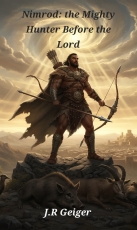
Book by: J.R. Geiger
Genre: Non-Fiction
The years passed as a slow, deliberate march across the vast, rolling terrain. Nimrod’s tribe, though still nomadic in spirit, had become a chain of faith stretching across the land. They were planting, not just following. At every place where the soil was rich and a spring flowed pure, families decided to root themselves, settling small, robust outlying farms—“Be fruitful and multiply, and fill the earth” (Genesis 9:7).
Nimrod understood that to fulfill the command, some must stop and secure the ground. He oversaw the building of strong fences, the digging of simple irrigation channels, and the establishment of shared granaries. He ensured these distant settlements remembered their heritage: they were to be stewards, not masters, of the land. “The earth is the Lord’s, and the fullness thereof” (Psalm 24:1). Leaders were chosen not for their strength, but for the gentleness of their service and the depth of their knowledge of Noah’s law.
The Slow Creep of Comfort
These remote farms were the necessary foundation of Nimrod’s influence. They were small acts of success, proving that human ingenuity, when blessed by God, could tame the wilderness. But with success came a subtle change. The constant threat of starvation and predators, which once kept their eyes fixed on the heavens, began to recede. Their tents grew larger. Their dependence on the next day’s hunt lessened.
The core group traveling with Nimrod had become restless, eager for permanence. They had reached the edge of the great plain, the legendary land of Shinar. “And as people journeyed eastward, they found a plain in the land of Shinar and settled there” (Genesis 11:2).
The land was flat, fertile, and inviting—a blank slate for human order. It promised predictability, soothing the memory of the Flood. Yet “Take care lest you forget the Lord your God” (Deuteronomy 8:11). The lessons of judgment were beginning to fade.
The Call to Settle
One clear morning, Nimrod stood at the edge of a rise overlooking the Euphrates. The clay-rich soil beneath his feet seemed to whisper permanence. A deep conviction settled in his bones—the quiet certainty Noah had promised him years ago.
“This is the spot,” he declared. “The Lord has led us to this place where the land is most willing to yield its fruit. Here, we will end the journey. Here, we will build a place not just of tents, but of permanence—a great settlement that will be a testament to the grace given to Noah.”
The people shouted their approval. They longed for security, not scattering. Their minds turned from the command to fill the earth toward the promise of one perfect home.
The first task was clear: to use the rich clay to make bricks. “Come, let us make bricks and burn them thoroughly. And they had brick for stone, and bitumen for mortar” (Genesis 11:3). This man-made material symbolized the break from the natural world.
Nimrod called this first city Babel. “The beginning of his kingdom was Babel, Erech, Accad, and Calneh, in the land of Shinar” (Genesis 10:10).
In his mind, Babel would be a covenantal capital, a place of worship and protection. But in the eyes of his people, Babel was something simpler—and more dangerous: the promise of never wandering again, never relying solely on the unseen hand of God.
Nimrod had found his land and founded his first city. He was now the hunter-king. The question remained: would he hunt beasts, or men’s ambitions?
© Copyright 2026 J.R. Geiger. All rights reserved.
Regular reviews are a general comments about the work read. Provide comments on plot, character development, description, etc.
In-line reviews allow you to provide in-context comments to what you have read. You can comment on grammar, word usage, plot, characters, etc.
I like how this is going. I know that a lot of the sayings are metaphorical in nature and not literal and this helps keep the story flowing. I am keen to see what Nimrod is intending to do. I think he has a handle on things but I suspect even he will not see what is coming.
Morag Higgins